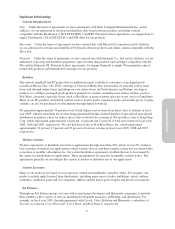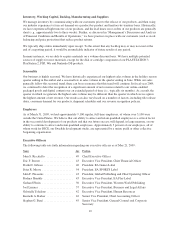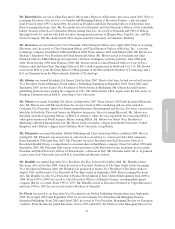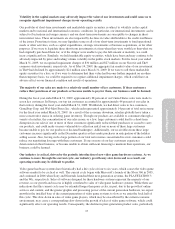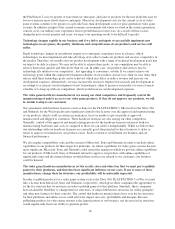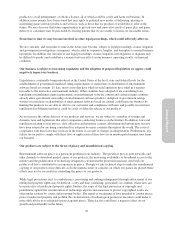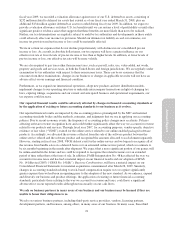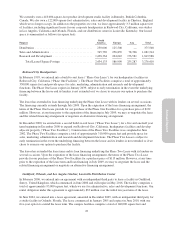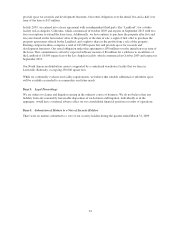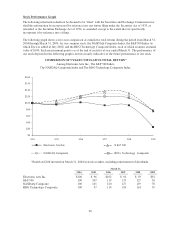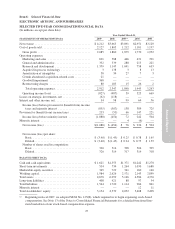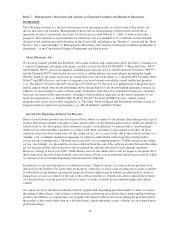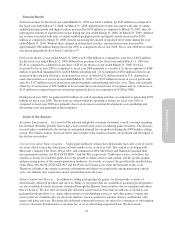Electronic Arts 2009 Annual Report Download - page 99
Download and view the complete annual report
Please find page 99 of the 2009 Electronic Arts annual report below. You can navigate through the pages in the report by either clicking on the pages listed below, or by using the keyword search tool below to find specific information within the annual report.
Annual Report
products to avoid infringement, or obtain a license, all of which could be costly and harm our business. In
addition, many patents have been issued that may apply to potential new modes of delivering, playing or
monetizing game software products and services, such as those that we produce or would like to offer in the
future. We may discover that future opportunities to provide new and innovative mode of game play and game
delivery to consumers may be precluded by existing patents that we are unable to license on reasonable terms.
From time to time we may become involved in other legal proceedings, which could adversely affect us.
We are currently, and from time to time in the future may become, subject to legal proceedings, claims, litigation
and government investigations or inquiries, which could be expensive, lengthy, and disruptive to normal business
operations. In addition, the outcome of any legal proceedings, claims, litigation, investigations or inquiries may
be difficult to predict and could have a material adverse effect on our business, operating results, or financial
condition.
Our business is subject to increasing regulation and the adoption of proposed legislation we oppose could
negatively impact our business.
Legislation is continually being introduced in the United States at the local, state and federal levels for the
establishment of government mandated rating requirements or restrictions on distribution of entertainment
software based on content. To date, most courts that have ruled on such legislation have ruled in a manner
favorable to the interactive entertainment industry. Other countries have adopted or are considering laws
regulating or mandating ratings requirements on entertainment software content and certain foreign countries
already allow government censorship of entertainment software products. Adoption of government ratings
system or restrictions on distribution of entertainment software based on content could harm our business by
limiting the products we are able to offer to our customers and compliance with new and possibly inconsistent
regulations for different territories could be costly or delay the release of our products.
As we increase the online delivery of our products and services, we are subject to a number of foreign and
domestic laws and regulations that affect companies conducting business on the Internet. In addition, laws and
regulations relating to user privacy, data collection and retention, content, advertising and information security
have been adopted or are being considered for adoption by many countries throughout the world. The costs of
compliance with these laws may increase in the future as a result of changes in interpretation. Furthermore, any
failure on our part to comply with these laws or application of these laws in an unanticipated manner may harm
our business.
Our products are subject to the threat of piracy and unauthorized copying.
Entertainment software piracy is a persistent problem in our industry. The growth in peer-to-peer networks and
other channels to download pirated copies of our products, the increasing availability of broadband access to the
internet and the proliferation of technology designed to circumvent the protection measures used with our
products all have contributed to an expansion in piracy. Though we take technical steps to make the unauthorized
copying of our products more difficult, as do the manufacturers of consoles on which our games are played, these
efforts may not be successful in controlling the piracy of our products.
While legal protections exist to combat piracy, preventing and curbing infringement through enforcement of our
intellectual property rights may be difficult, costly and time consuming, particularly in countries where laws are
less protective of intellectual property rights. Further, the scope of the legal protection of copyright and
prohibitions against the circumvention of technological protection measures to protect copyrighted works are
often under scrutiny by courts and governing bodies. The repeal or weakening of laws intended to combat piracy,
protect intellectual property and prohibit the circumvention of technological protection measures could make it
more difficult for us to adequately protect against piracy. These factors could have a negative effect on our
growth and profitability in the future.
19


